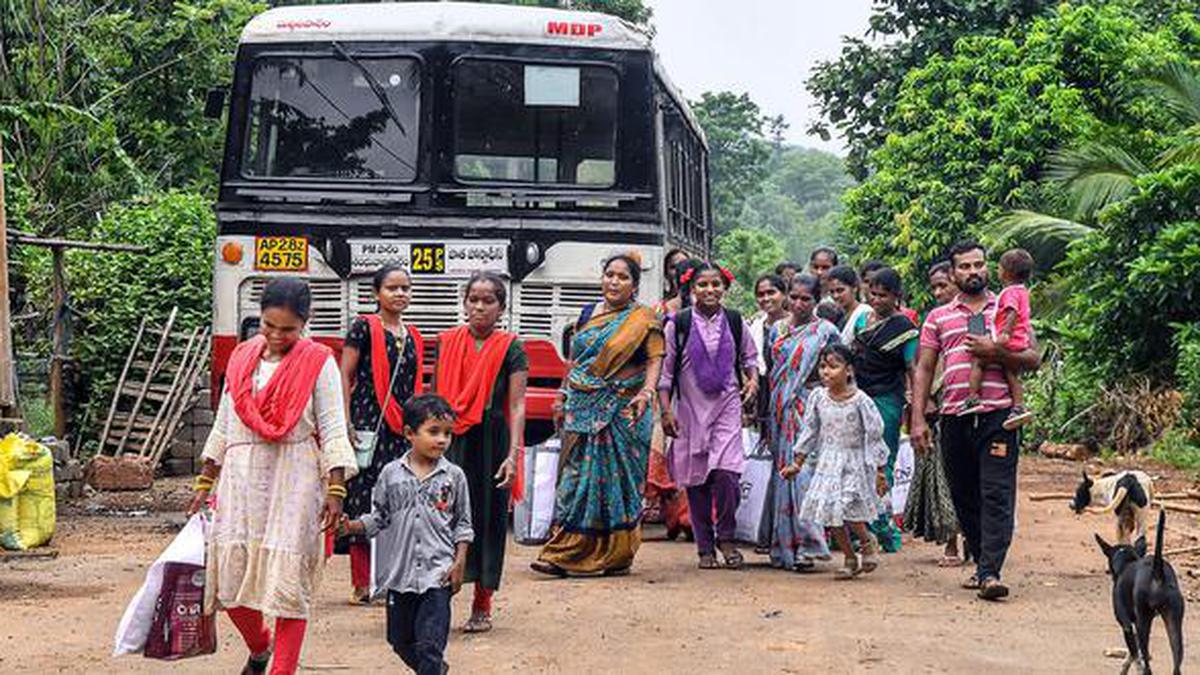
Bus to Sambhuvanipalem, tucked in reserve forest, brings cheer to tribals Premium
The Hindu
Residents of Sambhuvanipalem, a tribal village in Visakhapatnam, Andhra Pradesh, finally felt connected to the city on June 24 when an APSRTC bus drove down a kuchha road to the village. The bus will help students reach school on time and provide access to medical help in emergencies. Despite being within city limits, the village lacks basic amenities like drinking water, drainage system, garbage disposal, and mobile phone connectivity. Residents hope the government will now pay heed to their problems.
For residents of Sambhuvanipalem, June 24 was a day they finally felt connected to the city of Visakhapatnam in Andhra Pradesh, which their village is part of.
Bus no. 25 P/S, decked with marigold, drove down a kuchha road flanked by trees, its driver beaming to the 15-odd people, mostly women and children, who had come dressed in their colourful best, to take a ride. Temperatures had reached 40 degrees Celsius and a heatwave was imminent, but that was not a deterrent to dim the excitement of the arrival of the red-and-white APSRTC vehicle in the Kambalakonda forest reserve, where Sambhuvanipalem lies.
Connecting Sambhuvanipalem, a tribal village in ward number 6 of Greater Visakhapatnam Municipal Corporation (GVMC), the bus will run about 12 km to Maddilapalem. The village in the Bheemunipatnam constituency is about 17 km from the APSRTC complex in Dwaraka Nagar and just 6 km from Dr. YSR ACA VDCA Stadium, which has hosted a number of international cricket matches. Yet, it took 75 years after India’s Independence for public transport to reach an area that is not far from the city centre.
Among the first few who jumped in was K. Anitha, 15, with a heavy school bag weighing down one shoulder. She rushed to a window seat reserved for women, and settled in, wanting to see the forest from a vantage point. Venu, the conductor, waited for a few minutes before blowing his whistle. As the bus started, Anitha looked overjoyed.
“I will not be late for school any more,” she said, explaining how it would take at least an hour and a half to reach Chandramapalem, about 5 km away. “We used to walk in the forest for half an hour and pass a reservoir before reaching the nearest bus stop at P.M. Palem, some 3 km away from our village.” On luckier days they would get an auto-rickshaw from the village or a good Samaritan would offer them a lift to the bus stop.
“Exam days were stressful. We used to be exhausted by the time we reached school because we’d start an hour before,” she says, to ensure they were on time. “Many students from our village have dropped studies due to lack of proper transport facilities. We can focus on our studies now instead of thinking about how to reach school on time,” the student of Chandrampalem Zilla Parishad Government High School says.
Anitha’s close relative, K. Appalaraju, is also in the bus carrying his three-year old son, but in the men’s seat on the right. Mr. Appalaraju had studied in the village primary school. Later, he needed to go to a higher secondary school outside the forest, for which he struggled with transportation. After a year, he gave up studying. Now, he earns his livelihood as a carpenter.











